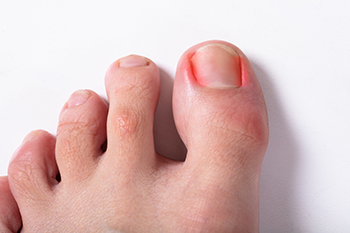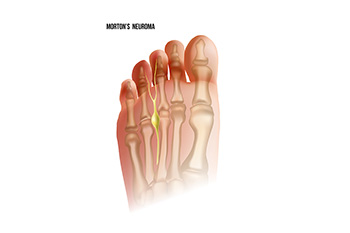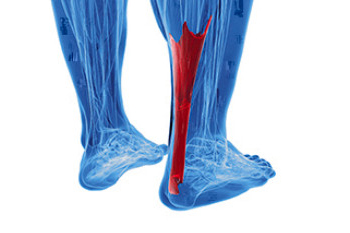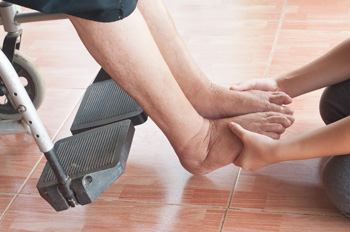Connect With Us
Blog
Items filtered by date: November 2023
Causes and Risks of Ingrown Toenails

Ingrown toenails can afflict individuals from various walks of life, but certain factors increase susceptibility to this uncomfortable condition. People with naturally curved toenails may find themselves more prone to ingrown toenails, as the curvature can encourage the nail to grow into the surrounding skin. Additionally, individuals who wear tight or ill-fitting footwear may unknowingly subject their toes to constant pressure, increasing the likelihood of ingrown toenails. Poor nail-trimming habits, such as cutting nails too short or rounding them at the edges, can also contribute to this ailment. Those with diabetes or circulation issues must be especially vigilant, as they may experience heightened vulnerability. Understanding the causes and recognizing one's predispositions is essential for proactive ingrown toenail prevention. If you have developed an ingrown toenail, it is strongly suggested that you are under the care of a podiatrist who can offer correct preventive and treatment methods.
Ingrown toenails may initially present themselves as a minor discomfort, but they may progress into an infection in the skin without proper treatment. For more information about ingrown toenails, contact one of our podiatrists of Fox Valley Foot and Ankle Specialists. Our doctors can provide the care you need to keep you pain-free and on your feet.
Ingrown Toenails
Ingrown toenails are caused when the corner or side of a toenail grows into the soft flesh surrounding it. They often result in redness, swelling, pain, and in some cases, infection. This condition typically affects the big toe and may recur if it is not treated properly.
Causes
- Improper toenail trimming
- Genetics
- Improper shoe fitting
- Injury from pedicures or nail picking
- Abnormal gait
- Poor hygiene
You are more likely to develop an ingrown toenail if you are obese, have diabetes, arthritis, or have any fungal infection in your nails. Additionally, people who have foot or toe deformities are at a higher risk of developing an ingrown toenail.
Symptoms
Some symptoms of ingrown toenails are redness, swelling, and pain. In rare cases, there may be a yellowish drainage coming from the nail.
Treatment
Ignoring an ingrown toenail can have serious complications. Infections of the nail border can progress to a deeper soft-tissue infection, which can then turn into a bone infection. You should always speak with your podiatrist if you suspect you have an ingrown toenail, especially if you have diabetes or poor circulation.
If you have any questions, please feel free to contact our office located in Naperville, IL . We offer the newest diagnostic and treatment technologies for all your foot care needs.
Do You Suffer From Painful Feet?
Definition and Common Symptoms of Morton’s Neuroma

Morton's neuroma is a painful foot condition that affects the ball of the foot, most commonly occurring between the 3rd and 4th toes. It is not a true neuroma, as the name suggests, but rather a thickening of the tissue around the nerve that leads to the toes. The main symptom of Morton's neuroma is localized pain, which can vary from a mild discomfort to an intense, burning sensation. The pain is typically aggravated by walking, wearing tight or narrow shoes, or putting pressure on the affected area. Some individuals describe it as feeling like there is a pebble or a fold in their sock, even when there isn't. Tingling and numbness in the toes may also accompany the pain. People with Morton's neuroma often find relief when they remove their shoes and massage the affected area. Early diagnosis and appropriate treatment can help alleviate the pain and prevent the condition from worsening. It is suggested to seek medical attention from a podiatrist if you suspect you have Morton's neuroma.
Morton’s neuroma is a very uncomfortable condition to live with. If you think you have Morton’s neuroma, contact one of our podiatrists of Fox Valley Foot and Ankle Specialists. Our doctors will attend to all of your foot care needs and answer any of your related questions.
Morton’s Neuroma
Morton's neuroma is a painful foot condition that commonly affects the areas between the second and third or third and fourth toe, although other areas of the foot are also susceptible. Morton’s neuroma is caused by an inflamed nerve in the foot that is being squeezed and aggravated by surrounding bones.
What Increases the Chances of Having Morton’s Neuroma?
- Ill-fitting high heels or shoes that add pressure to the toe or foot
- Jogging, running or any sport that involves constant impact to the foot
- Flat feet, bunions, and any other foot deformities
Morton’s neuroma is a very treatable condition. Orthotics and shoe inserts can often be used to alleviate the pain on the forefront of the feet. In more severe cases, corticosteroids can also be prescribed. In order to figure out the best treatment for your neuroma, it’s recommended to seek the care of a podiatrist who can diagnose your condition and provide different treatment options.
If you have any questions, please feel free to contact our office located in Naperville, IL . We offer the newest diagnostic and treatment technologies for all your foot care needs.
Achilles Tendon Bursitis

Achilles tendon bursitis is a painful condition that involves inflammation of the fluid filled sac, or bursa, located between the skin of the heel. Posterior Achilles tendon bursitis affects the back of the heel, while anterior Achilles tendon bursitis, also called retromalleolar bursitis, is felt in front of the attachment of the Achilles tendon to the heel bone. Symptoms include swelling, warmth, pain, and a tender spot at the back of the heel. Diagnosis by a podiatrist begins with a discussion of symptoms and a medical history, followed by a physical examination to identify signs of inflammation and tenderness. X-rays may be used to rule out other potential causes of heel pain, and in some cases, an ultrasound or MRI may provide more detailed views. The primary goal is to relieve inflammation and reduce pain. Treatment approaches may vary based on the severity and location of the pain. In rare cases, surgical intervention may be considered. For help in relieving the pain of Achilles tendon bursitis, it is suggested that you make an appointment with a podiatrist.
Achilles tendon injuries need immediate attention to avoid future complications. If you have any concerns, contact one of our podiatrists of Fox Valley Foot and Ankle Specialists. Our doctors can provide the care you need to keep you pain-free and on your feet.
What Is the Achilles Tendon?
The Achilles tendon is a tendon that connects the lower leg muscles and calf to the heel of the foot. It is the strongest tendon in the human body and is essential for making movement possible. Because this tendon is such an integral part of the body, any injuries to it can create immense difficulties and should immediately be presented to a doctor.
What Are the Symptoms of an Achilles Tendon Injury?
There are various types of injuries that can affect the Achilles tendon. The two most common injuries are Achilles tendinitis and ruptures of the tendon.
Achilles Tendinitis Symptoms
- Inflammation
- Dull to severe pain
- Increased blood flow to the tendon
- Thickening of the tendon
Rupture Symptoms
- Extreme pain and swelling in the foot
- Total immobility
Treatment and Prevention
Achilles tendon injuries are diagnosed by a thorough physical evaluation, which can include an MRI. Treatment involves rest, physical therapy, and in some cases, surgery. However, various preventative measures can be taken to avoid these injuries, such as:
- Thorough stretching of the tendon before and after exercise
- Strengthening exercises like calf raises, squats, leg curls, leg extensions, leg raises, lunges, and leg presses
If you have any questions please feel free to contact our office located in Naperville, IL . We offer the newest diagnostic tools and technology to treat your foot and ankle needs.
The Importance of Regular Foot Checks for the Elderly

As people age, their feet undergo changes, leading to potential issues like falls, foot ulcers, and discomfort. It is important to evaluate the feet as an essential part of older adults' regular health regimen that can identify and address foot-related concerns. Foot pain and ailments are prevalent among the elderly, necessitating consistent foot maintenance. Some individuals may struggle with basic foot care tasks, such as regular examination, washing, drying, moisturizing the feet, and trimming toenails. Additionally, a routine foot check can identify common issues and help in fall prevention. If you are elderly or taking care of an older person, it is suggested that you make an appointment with a podiatrist to set up a schedule for regular foot examinations and necessary care.
If you need your feet checked, contact one of our podiatrists of Fox Valley Foot and Ankle Specialists. Our doctors will attend to all of your foot and ankle needs and provide you with quality treatment.
Geriatrics and Podiatry
When people age, some common issues that may occur are bone density loss, dry skin, poor circulation, and rough brittle nails. These issues may also affect your foot health if the necessary steps are not taken to alleviate the problems.
It is important to take care of your feet because feet that are injured or diseased can affect your overall health. Having painful feet hinders your ability to do daily activities or may decrease your willingness to do the things that you need to do.
Visiting Your Geriatrician
As we age, health problems become more likely, so it is essential to visit your doctor for check-ups to ensure that you are doing the best you can to take care of your health. It is recommended to check your feet frequently for any possible cuts, bruises, swelling, corns or any other irregularities.
Taking Care of Elderly Feet
Cracked or dry feet can be treated by applying moisturizer often. It is also important not to wear old socks because the older the sock is, the higher the possibility there will be that there is bacteria there. Wear fresh socks and make sure they fit properly.
Proper foot health means that you can have a more active lifestyle and you will not be bogged down by pain. Foot health also leads to good circulation, which is paramount for overall health.
If you have any questions, please feel free to contact our office located in Naperville, IL . We offer the newest diagnostic tools and technology to treat your foot and ankle needs.
